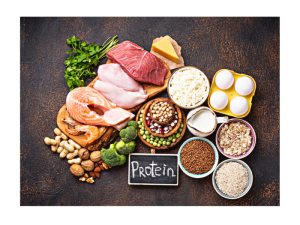Your thyroid is a large, butterfly-shaped gland in the throat. It is responsible for several vital functions of the body and has a major role in regulating your metabolism and your digestive function. It also supports the growth and development of the human body.
We’re going to delve into the role of the thyroid and why diet has such a big part in controlling your thyroid disorder. With this information and a quick guide to good and bad foods for your thyroid, you’ll be armed with the knowledge to empower yourself on your Keto Girl journey.
The thyroid’s function
The thyroid releases 2 hormones into the bloodstream – triiodothyronine (T3) and thyroxine (T4). T3 contains 3 atoms of iodine, and T4 contains 4. These hormones work together to control how your body uses energy. This affects your muscles, your nervous system, your mood, your energy level – even your temperature!
The release of these hormones controls the speed at which the cells in your body work. So, if you are getting too much T3 hormone, the cells are working faster than normal. This is known as ‘hyperthyroid’.
If you aren’t getting enough of the T3 hormone, the cells are working slower. And things – like your digestion – start to move sluggishly. This is known as ‘hypothyroid.’
Hashimoto’s disease is another relatively common thyroid disorder. This is actually an autoimmune condition that ‘attacks’ the thyroid’s hormone-producing cells. This leads to a decline in thyroid hormones and then descends into hypothyroidism.
Thyroid issues are common, but they tend to occur mostly in women. A hormone imbalance can usually be treated/supported by medication, but diet plays a vital role.
Good and bad foods for your thyroid
When it comes to your diet, certain food can aggravate thyroid conditions. Only a tiny amount of T3 is produced by the thyroid, so the rest comes from the gut which converts T4 into T3. Inflammatory foods actually prevent the gut’s full conversion of T4 into T3. So, if you’re suffering from a hormone imbalance, keeping inflammation under control through your diet will help your wellbeing.
Hypothyroidism can lead to sluggish digestive systems and weight gain. Choosing the right foods can reverse the thyroid condition and result in consistent weight loss.
That’s why a keto diet looks different for women with hypothyroidism and Hashimoto’s. Your individual needs will vary, depending on the type of thyroid condition you have, but I’m going to break down for you what the best and worst foods for your thyroid are.
Foods to eat

Here are some of the best foods for your thyroid. It’s great to include these ingredients as a part of your balanced meal plan.
- Fats – The good kind!
- Olive oil
- Avocado
- Brazil nuts
- Protein
- Chicken
- Fish
- Lean beef
- Low carb vegetables
- Leafy greens
- Carrots
- bell peppers
Foods to avoid

Below are some of the worst foods for your thyroid. This does not mean you can NEVER have them. But, it does mean you might want to limit your intake and get smart about how these ingredients affect your body.
Gluten
Gluten is a protein found in wheat and other grains. It’s a naturally occurring substance, but it creeps into a lot of processed food and can slow down your metabolism. This can leave you hungry and dissatisfied.
This is especially true for hypothyroid conditions. It’s not always obvious which foods contain gluten, so always read the label. The most common foods containing gluten are:
- Bread
- Baked Goods
- Cereal
- Pasta
- Processed foods like chips and crackers
- Sauces
- Soups
- Salad dressings
- Beer
- Malt
Dairy
Dairy products contain Insulin-like Growth Factor-1(IGF-1), and women with hypothyroidism and Hashimoto’s typically have higher levels of IGF-1 in the body already. So dairy in your diet increases the amount of insulin, leading to insulin resistance. This means that sugar gets converted to fat instead of energy.
Avoiding dairy helps the body improve your IGF-1 levels, and then, in turn, stops the advancement of thyroid disorder. Common dairy products are:
- Milk
- Cheese
- Yogurt
- Butter
- Cream
- Ice cream
- Whey
- Casein
- Sauces
- Dressings
Eggs
In people with hypothyroidism or Hashimoto’s, eggs are a common food intolerance. If you have an egg intolerance, it’s likely you’ll be unable to properly digest both the white and yolk of eggs.
Food intolerances lead to inflammation. So, while some forms of eggs – i.e. baked goods containing eggs might be ok, your best results will happen when egg consumption is limited. Eggs can pop up in surprising places though so watch out for:
- Baked goods
- Breakfast foods
- Bread
- Pasta
- Snacks
- Dressings
- Tortilla chips
Added sugar
Like dairy, added sugar increases your insulin levels, leading to insulin resistance – where sugar gets stored as fat, instead of used for energy. Sugar can sneak in to lots of things, such as:
- Candy
- Baked goods
- Yogurt and lots of milk products
- Pre-made soup
- Canned fruit
- Pre-made smoothies
- Dressings, sauces, condiments – like ketchup
- Soda
- Sports/energy drinks
- Juice
- Flavored coffee
- Iced tea
Soy
When it comes to soy, there’s no definitive answer. There’s some indication that soy can impact the natural function of thyroid health as it’s thought also sometimes to hinder the body’s absorption of thyroid medication. So while you may not need to avoid soy altogether, it’s definitely worth taking a look at your soy consumption.
This is not an exhaustive list, nor is it intended to scare you into avoiding the foods you want. Quite the opposite! I am an advocate for eating and drinking foods that you love. And I want to empower you to know what works for your body and take control of your thyroid disorder.
So if you want to reverse your hypothyroidism, reduce your medication requirements, and lose weight, get in touch today. KGN University will show you all this and more. It’s time to live life with more energy! Join Today!






